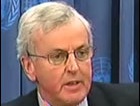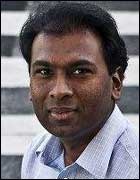 It is unfortunate that UN, the apex body meant to protect the weaker sections of humanity, is on the contrary exploiting the misery of Eezham Tamil civilians to abet the aims of their sworn oppressors, said K.Suthahar, an information counsellor of a refugee reception centre in Norway. "Top UN official John Holmes, would do better by convincing his organisation to first demonstrate that to what extent it can practically defy the genocidal agenda of the Sri Lankan state and in what ways it can protect the concerned civilians particularly, and the Tamil people in general. The first step is to take full responsibility of the civilians who are already in the concentration camps of Colombo. But the UN is unable even to free its own local workers in Colombo’s camps," he said.
It is unfortunate that UN, the apex body meant to protect the weaker sections of humanity, is on the contrary exploiting the misery of Eezham Tamil civilians to abet the aims of their sworn oppressors, said K.Suthahar, an information counsellor of a refugee reception centre in Norway. "Top UN official John Holmes, would do better by convincing his organisation to first demonstrate that to what extent it can practically defy the genocidal agenda of the Sri Lankan state and in what ways it can protect the concerned civilians particularly, and the Tamil people in general. The first step is to take full responsibility of the civilians who are already in the concentration camps of Colombo. But the UN is unable even to free its own local workers in Colombo’s camps," he said.
 "UN and the International Community try to downplay the crisis in the island as a mere issue of the civilians. The crisis management road-map of them is based on a treacherous, anti-people foundation," Suthahar said.
"UN and the International Community try to downplay the crisis in the island as a mere issue of the civilians. The crisis management road-map of them is based on a treacherous, anti-people foundation," Suthahar said.
"The crux of the problem is the Sri Lankan state. The UN and the IC should be able to deliver a deconstruction blow to the Sri Lankan state if they really want to resolve the crisis in the island. Time is running out for ‘private diplomacy’ to have any effect," he further said.
The UN Under Secretary-General for Humanitarian Affairs and Emergency Relief Coordinator, John Holmes, was quoted by Voice of America (VOA News) as saying that "it is clear that the LTTE did not allow those who wished to leave, civilians who wished to leave the area during this pause, to do so. They seem to have been actively prevented from doing so during the pause, as they have been before."
Meanwhile, the Inner City Press (ICP) on Wednesday reported: "Holmes acknowledged that UN staff members – who he pointed out are ‘local’ or ‘Sri Lankan national’ staff – are held without freedom of movement in the camps set up by the government."
When asked by the ICP if there are other countries in which UN staff are being similarly held but the UN is saying nothing, Holmes said: "I can’t think of a similar possibility at the moment."
The ICP commented: "Left unexplained is why the UN is treating Sri Lanka’s government different than, for example, those of Sudan or Israel, condemned by the UN for harming civilians while fighting armed opponents and for any detentions no matter how short in duration. While the UN expends significant time and diplomatic capital seeking political solutions in Darfur and the Middle East, it is unclear what if anything is being done in the case of Sri Lanka."
Holmes acknowledged that a ceasefire is not available at present circumstances and that they are trying to achieve something realistic.
Allowing UN agencies at the initial receiving point of civilians inside the Sri Lanka Army occupied zone would help to deal with the concern of alleged civilian disappearances and brutalities committed on them, Holmes said.
One of the observations of Holmes, of particular significance, was on the international media.
When asked by the ICP, whether the lack of media coverage has made his job more difficult with respect to Sri Lanka, Mr. Holmes acknowledged it by saying that it is "noticeable and regrettable." In a catastrophic situation such as it, "the lack of press access and lack of pictures from major press outlets" limits knowledge and concern, but it’s "beyond our control," he said.
(For updates you can share with your friends, follow TNN on Facebook and Twitter )
